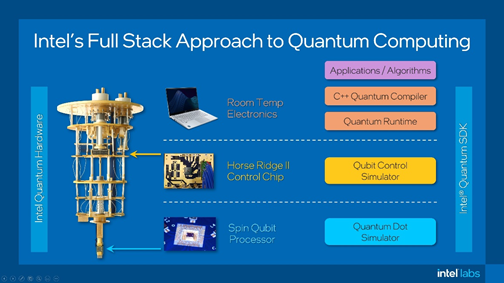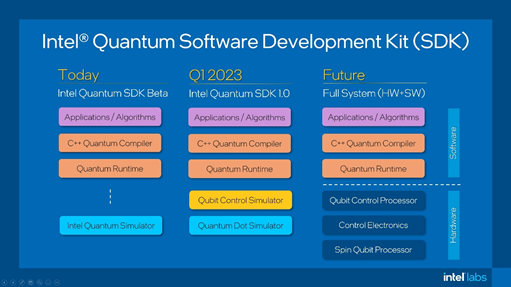Intel Labs launches beta version of Intel Quantum Software Development Kit
Quantum computing has the potential to significantly speed up the solution of complex problems and may also enable major breakthroughs in materials, chemicals and drug design, financial and climate modeling, and cryptography. While progress in qubits is an important step towards practical applications of quantum computing, significant progress will be needed across the entire hardware and software stack to fully realize the potential of this technology.

Intel takes a full system architecture approach that involves the entire computing stack, from qubit architecture and algorithm research to control electronics, interconnects, quantum software toolchains and compilers, all the way to the application layer. (Image source: Intel Corporation)
To advance this process, Intel Research has developed a full-stack software development kit called the Intel® Quantum Software Development Kit (Intel® Quantum SDK) that connects to Intel's quantum computing stack. The toolkit allows developers to write new quantum algorithms so that qubits can be run on simulated and real quantum hardware in the future. Currently, beta users are using it to explore chemical, material and fluid dynamics simulations, as well as algorithms for solving linear equations, which can be used in real-world scenarios such as financial modeling.
The Intel Quantum Software Development Kit has an intuitive user interface, provides a C++ compiler toolchain based on LLVM, a quantum operating environment optimized specifically for hybrid quantum-classical algorithms, and a high-performance Intel® Quantum Simulator (IQS) as a qubit target backend. Future versions of the toolkit will use different qubit target backends, including a quantum dot qubit simulator, and will eventually provide a backend with Intel quantum dot qubit devices as the target code.

The Intel Quantum Software Development Kit (SDK) has an intuitive user interface, provides a C++ language compiler toolchain based on LLVM, optimizes the quantum operating environment specifically for hybrid quantum-classical algorithms, and uses the high-performance Intel quantum simulator as the target code with quantum bits as the backend. In the future, this software development kit will be connected to Intel quantum bit hardware. (Image source: Intel Corporation)
In addition, Intel is also committed to building a quantum ecosystem. By using the industry-standard LLVM compiler, Intel is lowering the threshold for quantum developers because the LLVM compiler has a more user-friendly interface and is familiar to traditional computing developers. Users of the Intel Quantum Software Development Kit beta include the University of Applied Sciences Deggendorf and Leidos in Munich, Germany. The University of Applied Sciences Deggendorf is using the Intel Quantum Software Development Kit to study fluid dynamics problems that are important for aerodynamics and fluid mechanics, and Leidos is exploring application areas including computational chemistry and material modeling, as well as privacy protection and security of distributed computing.

A dilution refrigerator in the QuTech quantum computing lab. QuTech at TU Delft is Intel's quantum computing research partner in the Netherlands. (Image credit: Intel)
Intel is also supporting curriculum development and promoting the construction of a developer ecosystem to explore the application of quantum computing in programming. Universities will develop and share quantum course content to expand the use of Intel's quantum software development kit. Universities supported by Intel this year include Ohio State University, Pennsylvania State University, University of Pennsylvania, Deggendorf University of Applied Sciences, and Keio University.
The launch of the Intel Quantum Software Development Kit is Intel's initial effort to advance full-stack quantum development. As part of the testing process, Intel will collect user feedback and adjust the 1.0 version planned to be launched early next year. The test version of the Intel Quantum Software Development Kit is now available on the Intel Developer Cloud platform (Intel Dev Cloud).
Previous article:NXP launches new 5G front-end solution to help improve 5G network coverage and quality
Next article:Mouser Launches Fifth Edition of EIT Program - Explores the Potential of Private 5G Networks
- Popular Resources
- Popular amplifiers
- Wi-Fi 8 specification is on the way: 2.4/5/6GHz triple-band operation
- Three steps to govern hybrid multicloud environments
- Microchip Accelerates Real-Time Edge AI Deployment with NVIDIA Holoscan Platform
- Keysight Technologies FieldFox handheld analyzer with VDI spread spectrum module to achieve millimeter wave analysis function
- Qualcomm launches its first RISC-V architecture programmable connectivity module QCC74xM, supporting Wi-Fi 6 and other protocols
- Microchip Launches Broadest Portfolio of IGBT 7 Power Devices Designed for Sustainable Development, E-Mobility and Data Center Applications
- Infineon Technologies Launches New High-Performance Microcontroller AURIX™ TC4Dx
- Rambus Announces Industry’s First HBM4 Controller IP to Accelerate Next-Generation AI Workloads
- NXP FRDM platform promotes wireless connectivity
- LED chemical incompatibility test to see which chemicals LEDs can be used with
- Application of ARM9 hardware coprocessor on WinCE embedded motherboard
- What are the key points for selecting rotor flowmeter?
- LM317 high power charger circuit
- A brief analysis of Embest's application and development of embedded medical devices
- Single-phase RC protection circuit
- stm32 PVD programmable voltage monitor
- Introduction and measurement of edge trigger and level trigger of 51 single chip microcomputer
- Improved design of Linux system software shell protection technology
- What to do if the ABB robot protection device stops
- Analysis of the application of several common contact parts in high-voltage connectors of new energy vehicles
- Wiring harness durability test and contact voltage drop test method
- From probes to power supplies, Tektronix is leading the way in comprehensive innovation in power electronics testing
- From probes to power supplies, Tektronix is leading the way in comprehensive innovation in power electronics testing
- Sn-doped CuO nanostructure-based ethanol gas sensor for real-time drunk driving detection in vehicles
- Design considerations for automotive battery wiring harness
- Do you know all the various motors commonly used in automotive electronics?
- What are the functions of the Internet of Vehicles? What are the uses and benefits of the Internet of Vehicles?
- Power Inverter - A critical safety system for electric vehicles
- Analysis of the information security mechanism of AUTOSAR, the automotive embedded software framework
- Introducing the TI C2000 stack evaluation method
- MicroPython's official documentation has been significantly adjusted
- DISP0_CONTRAST is used as GPIO to drive LED
- (Bonus 6) GD32L233 Review - Random Numbers (with software random number generation algorithm)
- Disassembly of a compact portable negative ion generator
- Half-bridge DC/DC power supply based on LM5036
- Share ESP8266smartconfig source code
- The voltage of HM1548 cannot be raised to 24V. I have tried 10UH inductor and 22UF capacitor, but they are not good. Can someone take a look at it?
- Live broadcast has ended: Watch the Thanksgiving live broadcast and win an oscilloscope | High-speed oscilloscope basics and Keysight's new oscilloscope analysis
- BlueNRG-1 LSM6DSL Direction Detection

 TS971DT
TS971DT
















 京公网安备 11010802033920号
京公网安备 11010802033920号